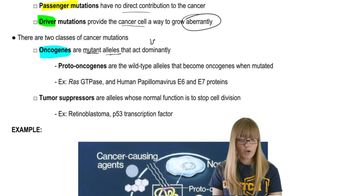Table of contents
- 1. Introduction to Genetics51m
- 2. Mendel's Laws of Inheritance3h 37m
- 3. Extensions to Mendelian Inheritance2h 41m
- 4. Genetic Mapping and Linkage2h 28m
- 5. Genetics of Bacteria and Viruses1h 21m
- 6. Chromosomal Variation1h 48m
- 7. DNA and Chromosome Structure56m
- 8. DNA Replication1h 10m
- 9. Mitosis and Meiosis1h 34m
- 10. Transcription1h 0m
- 11. Translation58m
- 12. Gene Regulation in Prokaryotes1h 19m
- 13. Gene Regulation in Eukaryotes44m
- 14. Genetic Control of Development44m
- 15. Genomes and Genomics1h 50m
- 16. Transposable Elements47m
- 17. Mutation, Repair, and Recombination1h 6m
- 18. Molecular Genetic Tools19m
- 19. Cancer Genetics29m
- 20. Quantitative Genetics1h 26m
- 21. Population Genetics50m
- 22. Evolutionary Genetics29m
19. Cancer Genetics
Cancer Mutations
Problem 9e
Textbook Question
Textbook QuestionGo to the website http://www.cancer.gov and select 'Cancer Types' on the top menu bar. Scroll down to 'Breast Cancer' and click. Select 'Cases & Prevention' from the options. Click 'More information' and select 'BRCA Mutations: Cancer Risk and Genetic Testing'. Use the information on this page to answer the following questions. What features of family history increase the likelihood that a woman will have a harmful mutation of BRCA1 or BRCA2?
 Verified Solution
Verified SolutionThis video solution was recommended by our tutors as helpful for the problem above
Video duration:
1mPlay a video:
Was this helpful?
Key Concepts
Here are the essential concepts you must grasp in order to answer the question correctly.
BRCA1 and BRCA2 Genes
BRCA1 and BRCA2 are genes that produce proteins responsible for repairing damaged DNA. Mutations in these genes can lead to an increased risk of breast and ovarian cancers. Understanding the role of these genes is crucial for assessing genetic predisposition to cancer and the implications of testing for mutations.
Recommended video:
Guided course

Mapping Genes
Family History and Genetic Risk
Family history plays a significant role in assessing genetic risk for conditions like breast cancer. A woman with close relatives (such as a mother, sister, or daughter) who have had breast or ovarian cancer, especially at a young age, may have a higher likelihood of carrying harmful BRCA mutations. This familial pattern can indicate inherited genetic susceptibility.
Recommended video:
Guided course

History of Genetics
Genetic Testing and Counseling
Genetic testing for BRCA mutations involves analyzing an individual's DNA to identify harmful changes in the BRCA1 or BRCA2 genes. Genetic counseling is recommended before and after testing to help individuals understand their risk, the implications of test results, and potential preventive measures. This process is essential for informed decision-making regarding health management.
Recommended video:
Guided course

History of Genetics

 4:50m
4:50mWatch next
Master Cancer Mutations with a bite sized video explanation from Kylia Goodner
Start learningRelated Videos
Related Practice


